trio
Reinecke - Lieder - Voice, Violin (Fl/Afl), Piano
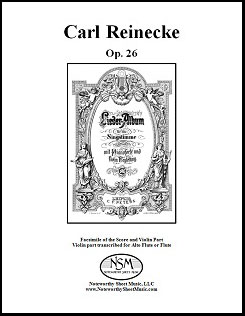 Waldesgruss and Frühlingsblumen, Op.26, by C. Reinecke
Waldesgruss and Frühlingsblumen, Op.26, by C. Reinecke
Facsimile Edition plus Transcriptions for Flute & Alto Flute by C.A.Vater
Score for Violin, Voice, & Piano, Violin Part, Flute & Alto Flute Parts, PDF $9.98
Carl Reinecke (1824-1910) was a renowned German pianist, composer, conductor, and teacher of composition. He composed numerous works, and for over 35 years was a leader of the music scene in Leipzig. Reinecke's Op.26 includes two songs for voice with accompaniment of violin and piano: No.1, Waldesgruss (The Forest's Greeting); and No.2, Frühlingsblumen (Spring Flowers). The vocal range of Reinecke's Op.26 lieder extends from C4 to A5, and thus is well-suited for either soprano or mezzo-soprano.
Our edition contains an "enhanced" facsimile of the original score and violin part, plus new transcriptions of the violin part for either alto flute or flute. Thus, the two songs may be performed utilizing the accompaniment of violin, alto flute, or flute, along with the voice and piano. Alternatively, these pieces work very well as an instrumental arrangement with the voice part played on flute, accompanied by alto flute and piano.
Score, 6 pages; Violin, Alto Flute, and Flute parts, 2 pages each; Total, 18 pages.
PreviewRoss - Cockles and Mussels - Harp Ensemble
 Cockles and Mussels, James Yorkston
Cockles and Mussels, James Yorkston
Arranged for Multi-Level Harp Ensemble by Judith Ross
Score and Parts for Harps I, II, & III, PDF $10.50
Cockles and Mussels, also known as Molly Malone or In Dublin's Fair City, is a popular song thought to have been first published in Boston, MA, in 1876, in a collection of college songs. The 1884 London version, published by Francis Brothers & Day, lists the piece as a comic song composed by James Yorkston. The piece is especially beloved in the city of Dublin, where a statue of Molly Malone has been erected on Grafton Street.
Judith Ross, founder and director of the Massachusetts Harp Ensemble, has created numerous mixed level harp arrangements over the years. She welcomes harpists of all levels of expertise into her ensemble, so most of her arrangements are designed to include parts of different levels of difficulty. That way, anyone can have a chance to participate and join in the fun. The Massachusetts Harp Ensemble is a Boston area treasure, enjoyed and appreciated by local harp students and their teachers, many of whom are already familiar with Ms. Ross' arrangements in manuscript form. Now some of these works are available to the broader harp community as new, typeset editions prepared by Noteworthy Sheet Music. Cockles and Mussels includes two intermediate level pedal harp parts and one easy lever harp part.
Preview================================================
US customers may purchase professionally-printed hard copies of Cockles and Mussels directly from Noteworthy Sheet Music for $17.85 plus a $5.95 shipping and handling fee. Please use the Contact Us form to let us know which edition(s) you would like to purchase, along with your contact information and your USPO mailing address.
Schubert - Auf dem Strom - Vo/Cl/Pf
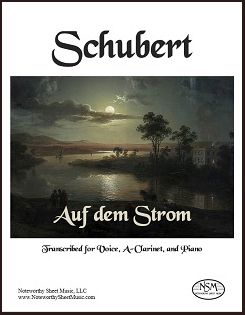 Auf dem Strom, Op.119, by Franz Schubert
Auf dem Strom, Op.119, by Franz Schubert
Obbligato transcribed for A-Clarinet by C. A. Vater
Piano Score and Parts for Voice and A-Clarinet, PDF $9.50
The great Austrian composer Franz Peter Schubert (1797-1828) was a master at creating extremely beautiful, melodic, emotional lieder. His song Auf dem Strom (On the River) provided a musical setting for the text of the eponymous poem written by the German poet and music critic Ludwig Rellstab. The lyrics tell the story of a sad parting, of the yearning and loneliness that sets in as the narrator bids farewell to a loved one on shore, while his river journey carries him away towards the sea. The premier performance of Auf dem Strom took place in Schubert’s 1828 public concert, during which the obbligato part was played by Josef Lewy on horn, the instrument for which the obbligato was written and which undoubtedly can provide an appropriately mournful, sentimental character to the piece. However, an alternate obbligato version for cello was also published. Now, with all respect, we provide an A-clarinet version of the obbligato, in expectation that clarinetists will appreciate this addition to the voice/clarinet/piano repertoire. We believe that a well-played clarinet can aptly contribute a suitably complex, dolorous essence and tone that will adequately do justice to this highly romantic lied by Schubert. Schubert himself created one of his most wonderful and popular works, Der Hirt auf dem Felsen, for clarinet obbligato, and we hope he would welcome our adaptation of Auf dem Strom for A-clarinet.
Score, 19 pages; Voice part, 4 pages; A-Clarinet part, 4 pages; Total, 32 pages.
PreviewSchubert - Auf dem Strom - Voice/Bass Flute/Pf
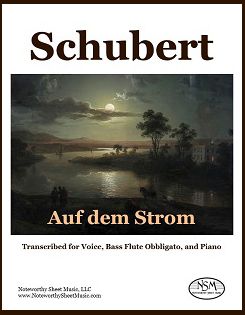 Auf dem Strom, Op.119, by Franz Schubert
Auf dem Strom, Op.119, by Franz Schubert
Obbligato transcribed for Bass Flute by C. A. Vater
Piano Score and Parts for Voice and Bass Flute, PDF $9.50
The great Austrian composer Franz Peter Schubert (1797-1828) was a master at creating extremely beautiful, melodic, emotional lieder. His song Auf dem Strom (On the River) provided a musical setting for the text of the eponymous poem written by the German poet and music critic Ludwig Rellstab. The lyrics tell the story of a sad parting, of the yearning and loneliness that sets in as the narrator bids farewell to a loved one on shore, while his river journey carries him away towards the sea. The premier performance of Auf dem Strom took place in Schubert's 1828 public concert, during which the obbligato part was played by Josef Lewy on horn, the instrument for which the obbligato was written and which undoubtedly can provide an appropriately mournful, sentimental character to the piece. However, an alternate obbligato version for cello was also published. Now, with all respect, and at the suggestion of our flutist colleague Peter H. Bloom, we offer a bass flute version of the obbligato. Most of the transposed horn part falls nicely within the sweet range of the bass flute, and very few adaptations were required. Though clearly having different sonic qualities than a horn, the bass flute lends a forlorn, haunting, earthy tone that can well do justice to this Schubert song. After giving the bass flute obbligato a try, Mr. Bloom commented: "Fabulous! // The tone-color of the bass flute for this number is gorgeous."
Piano score, 19 pages; Bass Flute part, 4 pages; Total, 32 pages.
PreviewSchubert - Der Hirt auf dem Felsen - Alto Flute (clarinet trans.)
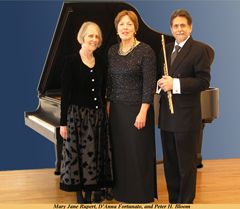 Der Hirt auf dem Felsen, Op.129, by F. Schubert
Der Hirt auf dem Felsen, Op.129, by F. Schubert
Obbligato Transcribed for Alto Flute in G by Peter H. Bloom
Alto Flute Part, PDF $5.99
In the preface to his transcription, Mr. Bloom writes: "In terms of color, nuance, expression, dynamics, and tessitura the obbligato works exquisitely on the alto flute. Theobald Boehm (1794-1881) designed our first modern alto flute in 1847. Had Schubert (born in 1797) survived to hear it, I have no doubt that he would have made the alto flute an essential part of his armory of orchestration. .... Der Hirt auf dem Felsen is very effective, also, in a purely instrumental arrangement for flute (taking the vocal line) and alto flute obbligato. It's an ideal didactical vehicle for coaching the developing flutist in the art of rhetorical performance as well as a splendid concert/recital piece."
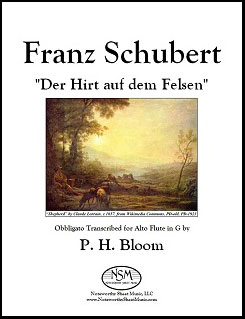 The premiere of Schubert's The Shepherd on the Rock, with obbligato transcribed for alto flute, was performed by D'Anna Fortunato (Mezzo-Soprano), Peter H. Bloom (Alto Flute), and Mary Jane Rupert (Piano) during a concert at the Gibson Theatre in Elmira, NY, on November 3, 2009, as part of the Elmira College Encore Series.
The premiere of Schubert's The Shepherd on the Rock, with obbligato transcribed for alto flute, was performed by D'Anna Fortunato (Mezzo-Soprano), Peter H. Bloom (Alto Flute), and Mary Jane Rupert (Piano) during a concert at the Gibson Theatre in Elmira, NY, on November 3, 2009, as part of the Elmira College Encore Series.
"Flutist Peter Bloom has done an invaluable service to Schubert and to concert singers by providing this charming arrangement, for alto flute, of the original clarinet obbligato to Der Hirt auf dem Felsen. I've performed it in this version on several occasions and find that the flute timbre is alluring. It's so easy to blend with and respond to the alto flute! I believe that, had it been possible, the composer, himself, would have truly enjoyed this arrangement at a Schubertiade performance of his own." —D'Anna Fortunato
We provide our alto flute transcription of the obbligato part, originally for clarinet. The voice and piano parts are readily available as a free pdf download of the score, from sources such as imslp.org/.
Alto Flute part, 4 pages of music; Total, 8 pages.
PreviewSchubert - Erlking - Flute, Cello & Piano
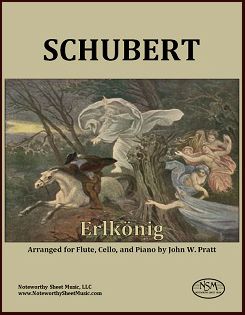 Erlkönig, Franz Schubert
Erlkönig, Franz Schubert
Arranged for Flute, Cello, and Piano by John W. Pratt
Piano Score and Parts for Flute and Cello; PDF $11.99
Franz Schubert (1797-1828), inspired by reading Goethe's poem, wrote his song "Erlkönig" in a few hours in 1815. The song was an immediate hit, and continues to be popular to the present day. Numerous transcriptions have been prepared, but surprisingly none that we found for flute, cello, and piano. John Pratt has created such a trio arrangement, listed here, and also a duet version of the piece with Schubert's solo part adopted without change but with a less punishing alternative to Schubert's piano accompaniment.
Excerpted from Mr. Pratt's © preface:
"In the trio arrangement, the flute provides a natural voice for the child and for the mysterious Erlking, whose words are in the child's head. The cello makes a natural father. The narration is mostly given to the cello also, but the flute takes over when the child is mentioned in bars MM 24-30, and joins the cello when the ride is ending in anguish and distress (MM 139-145). The piano is treated as a member of a trio rather than an accompaniment to a voice singing words. The presence of the cello helps free the piano from the constant pounding and allows it to employ a wider range of expressive sonorities than Schubert's, befitting the absence of words. One might view the result as a kind of tone poem."
Preview
Schubert – Der Hirt auf dem Felsen – Alto Flute (voice trans.)
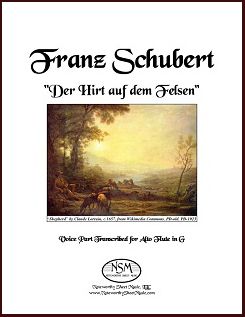 Der Hirt auf dem Felsen, Op.129, by F. Schubert
Der Hirt auf dem Felsen, Op.129, by F. Schubert
Voice Part Transcribed for Alto Flute in G by Carol A. Vater
Alto Flute Part, PDF $5.99
NSM published Peter H. Bloom's alto flute transcription of the clarinet obbligato from Schubert's Shepherd on the Rock in 2012. Please find information about that publication in our article for that edition. Later we realized that the voice part, which I (cav) have performed on flute in a flute/clarinet/piano group, would work much better when played on alto flute. So we created a transcription of the vocal part for alto flute. This alto flute transcription is to be played in an entirely instrumental version of Der Hirt auf dem Felsen for alto flute, clarinet (or alto flute), and piano, which as noted by Mr. Bloom, is "an ideal didactical vehicle for coaching the developing flutist in the art of rhetorical performance as well as a splendid concert/recital piece." Our alto flute transcription of the voice part is a simple transposition requiring no octave changes; the part falls naturally and beautifully within the alto flute range. The clarinet part and piano score are freely available at IMSLP.org.
Alto Flute part (in lieu of voice), 5 pages of music; Total, 10 pages.
Preview